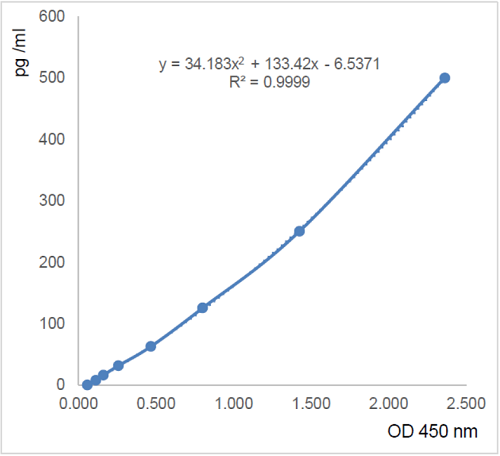IL-36alpha (human) ELISA Kit
Product Code:
AG-45B-0013
AG-45B-0013
Regulatory Status:
RUO
RUO
Target Species:
Human
Human
Shipping:
Blue Ice
Blue Ice
Storage:
+4°C
+4°C
No additional charges, what you see is what you pay! *
| Code | Size | Price |
|---|
| AG-45B-0013-KI01 | 96 wells | £540.00 |
Quantity:
Prices exclude any Taxes / VAT
Stay in control of your spending. These prices have no additional charges, not even shipping!
* Rare exceptions are clearly labelled (only 0.14% of items!).
* Rare exceptions are clearly labelled (only 0.14% of items!).
Multibuy discounts available! Contact us to find what you can save.
This product comes from: Switzerland.
Typical lead time: 7-10 working days.
Contact us for more accurate information.
Typical lead time: 7-10 working days.
Contact us for more accurate information.
- Further Information
- Documents
- Show All
Further Information
Alternate Names/Synonyms:
Interleukin-1 Family Member 6; IL-1F6
Assay Type:
Sandwich
Detection Type:
Colorimetric
EClass:
32160000
Handling Advice:
After standard reconstitution, prepare aliquots and store at -20°C.Avoid freeze/thaw cycles.Plate and reagents should reach room temperature before use.
Long Description:
ELISA Assay. Detects natural and recombinant human IL-36alpha (IL-1F6). Colorimetric sandwich assay. Sample types: Cell Culture Supernatant, Plasma, Serum. Range: 7.8 to 500pg/ml. Sensitivity: 4pg/ml. IL-36alpha (IL-1F6), IL-36beta (IL-1F8) and IL-36gamma (IL-1F9) are members of the IL-1 cytokine family that bind to IL-36R (IL-1Rrp2) and IL-1RAcP, activating similar intracellular signals as IL-1 and are inhibited by IL-36Ra. IL-36alpha, beta and gamma cytokines, similarly to IL-1beta, need to be processed to acquire their full agonist or antagonist activity. Neutrophils proteases have been identified as the chief regulators of the processing of all the IL-36 family members, although with different specificity and affinity. IL-36alpha seems to be activated by both neutrophil Elastase and cathepsin-G, however, with differential patterns. The expression of IL-36 cytokines occurs mainly in the lung and skin and can be derived from diverse epithelial cell types including keratinocytes, bronchial epithelium as well as macrophages, monocytes and different T cell subsets. IL-36 family members induce the production of pro-inflammatory cytokines, including IL-12, IL-1beta, IL-6, TNF-alpha and IL-23, thus promoting neutrophil influx, dendritic cell (DC) activation, polarization of T helper type 1 (Th1) and IL-17-producing T cells (alphabeta T cells and gammadelta T cells) and keratinocyte proliferation. The IL-36 cytokines may represent potential targets for immune-mediated inflammatory conditions or, alternatively, could be used as adjuvants in vaccination. IL-36alpha and IL-36beta augmented IL-17A-mediated induction of antibacterial peptides in psoriasis. A significant increase in circulating and tissue levels of IL-36alpha occurs in Sjögren?s syndrome patients. An increased expression of IL-36 alpha and IL-36 gamma, but not IL-36 beta has been observed in colonic inflammatory lesions from patients with inflammatory bowel disease, more prominently in ulcerative colitis. Association between IL-36 and Th17 responses was also confirmed in Crohn?s disease, although the expression of IL-36 in this population was significantly lower than in psoriasis. All members of the IL-36 subfamily are expressed during estrous cycle and pregnancy. IL-36alpha has also been involved in the prognosis of hepatocellular carcinoma, where its expression correlates negatively with tumor size, degree of differentiation, and level of vascular invasion. Correspondingly, high levels of IL-36alpha are positively correlated to the overall survival of patients.
NCBI, Uniprot Number:
Q9UHA7
Package Type:
Box
Product Description:
IL-36alpha (IL-1F6), IL-36beta (IL-1F8) and IL-36gamma (IL-1F9) are members of the IL-1 cytokine family that bind to IL-36R (IL-1Rrp2) and IL-1RAcP, activating similar intracellular signals as IL-1 and are inhibited by IL-36Ra. IL-36alpha, beta and gamma cytokines, similarly to IL-1beta, need to be processed to acquire their full agonist or antagonist activity. Neutrophils proteases have been identified as the chief regulators of the processing of all the IL-36 family members, although with different specificity and affinity. IL-36alpha seems to be activated by both neutrophil elastase and cathepsin G, however, with differential patterns. The expression of IL-36 cytokines occurs mainly in the lung and skin and can be derived from diverse epithelial cell types including keratinocytes, bronchial epithelium as well as macrophages, monocytes and different T cell subsets. IL-36 family members induce the production of pro-inflammatory cytokines, including IL-12, IL-1beta, IL-6, TNF-alpha and IL-23, thus promoting neutrophil influx, dendritic cell (DC) activation, polarization of T helper type 1 (Th1) and IL-17-producing T cells (alphabeta T cells and gammadelta T cells) and keratinocyte proliferation. The IL-36 cytokines may represent potential targets for immune-mediated inflammatory conditions or, alternatively, could be used as adjuvants in vaccination. IL-36alpha and IL-36beta augmented IL-17A-mediated induction of antibacterial peptides in psoriasis. A significant increase in circulating and tissue levels of IL-36alpha occurs in Sjögren?s syndrome patients. An increased expression of IL-36alpha and IL-36gamma, but not IL-36beta has been observed in colonic inflammatory lesions from patients with inflammatory bowel disease, more prominently in ulcerative colitis. Association between IL-36 and Th17 responses was also confirmed in Crohn?s disease, although the expression of IL-36 in this population was significantly lower than in psoriasis. All members of the IL-36 subfamily are expressed during estrous cycle and pregnancy. IL-36alpha has also been involved in the prognosis of hepatocellular carcinoma, where its expression correlates negatively with tumor size, degree of differentiation and level of vascular invasion. Correspondingly, high levels of IL-36alpha are positively correlated to the overall survival of patients.
Range:
7.8 to 500pg/ml
Sample Type:
Cell Culture Supernatant, Plasma, Serum
Sensitivity:
4pg/ml
Specificity:
Detects natural and recombinant human IL-36alpha (IL-1F6).
Transportation:
Non-hazardous
UNSPSC Category:
ELISA Kits
UNSPSC Number:
41116126
Use & Stability:
12 months after the day of manufacturing. See expiry date on ELISA Kit box.



